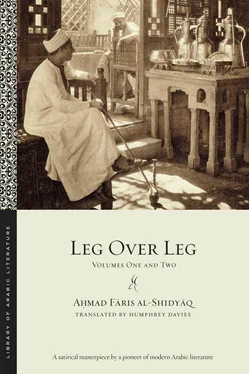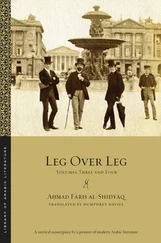25“… summation” ( al-khur… fah ): see n. 22 above.
26“cutting character” ( ḥarf bātir ): or, punningly, “cutting edge.”
27“will pull back from you blinded” ( yakuffu ʿanka kafīfā ): or, punningly, “will pull back from you entirely.”
28“Isn’t ‘of a certain stamp’ the same in meaning as * ‘Of a certain type,’ with the addition of the thwack of a stick?” ( a-wa-laysa inna l-ḍarba mithlu l-ṣanfi fī l-maʿnā wa-qarʿu ʿaṣan ilay-hi uḍīfā ): ḍarb has “blow, stroke” as its basic meaning but also a subsidiary meaning of “type, kind” (synonym ṣanf ); hence, things that are of a certain ḍarb may be conceived of (jokingly) as delivering a certain percussive force. The overall sense of these two couplets seems to be “Do not be offended if the contents of the book, and (perhaps especially) the various lists that I have compiled, is somewhat rebarbative.”
29“It does not strike the noses of mortals”: i.e., its injurious consequences harm none but me.
30“Raising a Storm” ( Fī ithārat riyāḥ ): compare the earlier description of the book as falling “like the wind in the valley when / Stirred up” (0.4.9); the first chapter of each of the four books of which the work is composed bears a title that, like this one, has little to do with the events recounted in that chapter but denotes the initiation of some energetic activity. For further discussion of chapter titles, see the Translator’s Afterword (Volume Four).
31“How many a pot calls the kettle black!” ( wa-muḥtaris min mithlihi wa-hwa ḥāris ): “From many a one such as he does he guard himself though he is himself a guardian,” a proverb “alluding to him who finds fault with a bad man when he is himself worse than he” (Edward Lane, An Arabic-English Lexicon , 8 vols., London: Williams and Norgate, 1863 (offset ed. Beirut: Librairie du Liban, 1968), s.v. muḥtaris ).
32“You’ve made a bad business worse!” ( ʿāda l-ḥays yuḥās ): “The sloppy date mixture has been made sloppier,” said when someone is called upon to make good something done badly by another and makes it worse (Aḥmad ibn Muḥammad al-Maydānī, Majmaʿ al-amthāl , 2 vols. (Cairo: al-Maṭbaʿah al-Khayriyyah, 1310/1892–93), 1:316).
33“Make the most of what you’re given!” ( khudh min Jidhʿ mā aʿṭāk ): “Take from Jidhʿ whatever he may give you.” The pre-Islamic Ghassanid Arabs had been obliged to pay a certain king protection money; when the king died and his son came to collect his money from a Ghassanid named Jidhʿ, the latter beat him with his sword and pronounced the words in question, after which the Ghassanids stopped paying the tax (al-Maydānī, Majmaʿ , 1:156).
34“So what are you going to do about it?!” ( shaḥmatī fī qalʿī ): “My fat is in my shepherd’s bag.” The wolf, asked what he would do if he came upon sheep guarded by a shepherd boy, replied that he would fear the boy’s arrows that were in his shepherd’s bag, but when asked, “What if the shepherd were a girl?” replied as given, meaning “I should do with them as I liked” (al-Maydānī, Majmaʿ , 1:246).
35To confound his putative critic, the author produces four impeccably classical proverbs, each of which consists of the words ʿalā ẓalʿika “regarding thy limping” preceded by an imperative verb: irbaʿ ʿalā ẓalʿika (“Restrain thyself because of thy limping,” i.e., “Do not overreach yourself”), irqa ʿalā ẓalʿika (“Ascend thou the mountain with knowledge as to thy limping,” i.e., “Do not make idle threats”), irqaʾ ʿalā ẓalʿika (apparently meaning “Be gentle with thyself, and impose not upon thyself more than thou art able to perform… or abstain thou, for I know thine evil qualities or actions… or… rectify thou, or rightly dispose, first thy case, or thine affair”), and qi ʿalā ẓalʿika (“Be cautious as to thy limping,” i.e., “If you live in a glass house, don’t throw stones”) (see Lane, Lexicon , s.v. ẓalaʿa ).
36“Another of Khurāfah’s tales, Umm ʿAmr!” ( Ḥadīthu Khurāfah yā Umma ʿAmr ): Khurāfah was a man of the tribe of ʿUdhrah who claimed to have been carried off by the jinn but whose tales of which were, on his return, dismissed as lies; thus khurāfāt has come to mean in modern usage “superstitions, fables, fairy stories.” Umm ʿAmr (“Mother of ʿAmr”) is an epithet of the hyena; her frequent apostrophization in proverbs and anecdotes appears to be related to the conventional view of the hyena as “the stupidest of beasts” (see al-Maydānī, Majmaʿ , 1:160); thus the sense is something like “It’s all a pack of lies, you imbecile!”
37 abīlīn , pl. of abīl , “one who beats the nāqūs ,” a plank beaten with rods to summon Christians to prayer.
38“the Great Catholicos” ( al-jāthilīq al-akbar ): the leader of Eastern Orthodox Christians living under Muslim rule.
39“the Supreme Pontiff” ( al-ʿasaṭūs al-aʿẓam ): the Pope of Rome.
40“Ascribing partners to God” ( al-shirk ): i.e., polytheism.
41“pronounce letters like Qurʾān readers” ( tuqalqilūn ): qalqalah is “a quality unique to recitation [consisting of] the insertion of [ǝ] (schwa) after syllable-final [q], [d], [ṭ], [b], and [j]” (Kristina Nelson, The Art of Reciting the Qurʾan (Cairo: American University in Cairo Press, 2001), 22). Such a pronunciation would sound bizarre in non-Qurʾanic contexts.
42“falter” ( taḥṣarūn ): the repetition is the author’s.
43“tightened” ( mufarram ): cf. the Qāmūs , “ al-farm … is a medicament with which a woman becomes narrower” and Lane, Lexicon , “ farama … to constrict the vulva with raisin stones.”
44“in two different forms” ( al-ʿakhtham wa-l-khathīm ): while the second word reads in the text wa-l-khashīm , this word, which is not found in the lexica, must be a misprint for wa-l-khathīm , which the Qāmūs gives as a synonym of the former.
45“the just plain large one” ( al-ʿumāriṭī ): defined in the Qāmūs as farj al-marʾah al-ʿaẓīm (“a woman’s large vagina”).
46“the buttocks but with a slightly different spelling” ( al-būṣ ): the author has already used al-bawṣ above; the Qāmūs gives both spellings.
47 al-ḥāriqah : literally “the woman who rubs, or burns.” The Qāmūs gives other possibly appropriate meanings, such as “the woman who is so overcome by lust that she grinds her teeth one upon another out of fear lest that lust take her to the point of neighing and snorting.”
48“the woman whose vagina is wide open and the woman whose vagina is open wide” ( al-khijām wa-l-khajūm ): according to the Qāmūs , the two forms are synonymous.
49“the woman with the tiny vagina a man can’t get at (again, but a different word)” ( al-marfūghah ): cf. twenty-one items earlier ( al-marṣūfah ).
50 al-maṣūṣ : also (the Qāmūs ), the “vagina that dries the liquid from the surface of the penis.”
51 al-bayẓ : also (the Qāmūs ) “the water of the woman or man.”
52“the clitoris said with a funny accent” ( al-ʿuntul ): “the clitoris ( baẓr ); a dialectal variant of ʿunbul ” ( Qāmūs ).
Читать дальше












